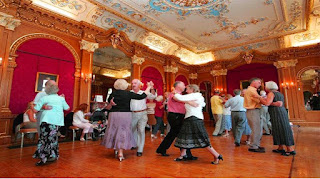As we develop more established we endure a decrease in mental and physical wellness, which can be aggravated by conditions like Alzheimer's sickness. Another examination, distributed in the open-get to diary Frontiers in Human Neuroscience, demonstrates that more established individuals who routinely share in physical exercise can invert the indications of maturing in the mind, and moving has the most significant impact.
"Exercise has the gainful impact of backing off or notwithstanding neutralizing age-related decrease in mental and physical limit," says Dr Kathrin Rehfeld, lead creator of the investigation, based at the German community for Neurodegenerative Diseases, Magdeburg, Germany. "In this investigation, we demonstrate that two distinct sorts of physical exercise (moving and aerobic exercise) both increment the territory of the mind that decays with age. In correlation, it was just moving that prompt observable behavioral changes regarding enhanced adjust."
Elderly volunteers, with a normal age of 68, were enrolled to the examination and doled out either an eighteen-month week after week course of learning move schedules, or perseverance and adaptability preparing. The two gatherings demonstrated an expansion in the hippocampus district of the cerebrum. This is essential since this region can be inclined to age-related decay and is influenced by illnesses like Alzheimer's. It likewise assumes a key part in memory and learning, and keeping one's adjust.
While past research has demonstrated that physical exercise can battle age-related cerebrum decay, it is not known whether one kind of activity can be superior to another. To survey this, the activity schedules given to the volunteers contrasted. The conventional wellness preparing program directed fundamentally dull activities, for example, cycling or Nordic strolling, yet the move gather were tested with something new every week.
Dr Rehfeld clarifies, "We attempted to give our seniors in the move amass with continually changing move schedules of various kinds (Jazz, Square, Latin-American and Line Dance). Steps, arm-designs, developments, speed and rhythms were changed each second week to keep them in a consistent learning process. The most difficult angle for them was to review the schedules under the weight of time and with no prompts from the educator."
These additional difficulties are thought to represent the discernible contrast in adjust showed by those members in moving gathering. Dr Rehfeld and her associates are expanding on this examination to trial new work out schedules that have the capability of augmenting against maturing impacts on the cerebrum.
"At this moment, we are assessing another framework called "Jymmin" (sticking and gymnastic). This is a sensor-based framework which creates sounds (tunes, cadence) in light of physical movement. We realize that dementia patients respond unequivocally when tuning in to music. We need to consolidate the promising parts of physical action and dynamic music making in an attainability think about with dementia patients."
Dr Rehfeld closes with counsel that could get us up out of our seats and moving to our most loved beat.
"I trust that everyone might want to carry on with an autonomous and sound life, for whatever length of time that conceivable. Physical action is one of the way of life factors that can add to this, neutralizing a few hazard factors and backing off age-related decrease. I think moving is an effective instrument to set new difficulties for body and psyche, particularly in more established age."
This examination falls into a more extensive accumulation of research exploring the psychological and neural impacts of physical and subjective movement over the life expectancy.





No comments:
Post a Comment